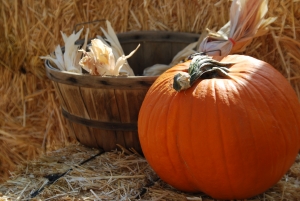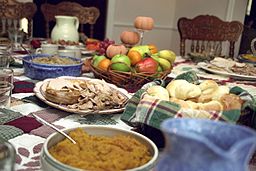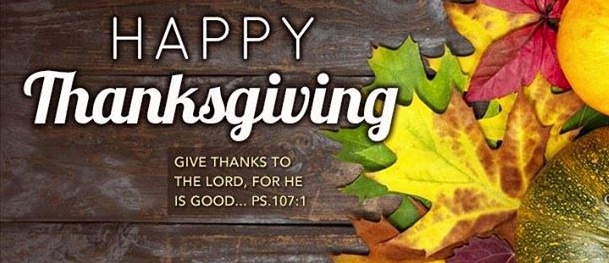Thanksgiving–An American Holiday
 Thanksgiving is an American holiday primarily. Or maybe I should say a North American holiday because Canada celebrates Thanksgiving much the way we in the US do. Mexico is the exception.
Thanksgiving is an American holiday primarily. Or maybe I should say a North American holiday because Canada celebrates Thanksgiving much the way we in the US do. Mexico is the exception.
Of course a number of countries celebrate a type of harvest festival. Australia apparently celebrates six different harvest-related festivals, including one for wheat, others for hops and for apples, for grapes and for oranges and even for lavender.
Other countries that celebrate some type of harvest festival include China, Korea, Greece, and Portugal.
Interestingly, I discovered a couple places that celebrate a type of Thanksgiving directly related to the US celebration. One is Liberia, the African nation founded by former slaves from the US:
Mainly celebrated by Christians, Liberians take the concept of the cornucopia and fill their churches with baskets of local fruits like bananas, papayas, mangoes, and pineapples. An auction for these is held after the service, and then families retreat to their homes to feast. Concerts and dancing have evolved as a distinctive part of Liberia’s Thanksgiving traditions. (“How Seven Other Nations Celebrate Thanksgiving”
Another is Norfolk Island located in the Pacific between Australia and New Zealand. Apparently in the late 1800s an American trader named Isaac Robinson introduced the idea of decorating a local church to draw whalers to a special Thanksgiving service. The tradition took root.
Grenada began their tradition quite recently.
Held on October 25 every year, Grenada’s Thanksgiving marks the anniversary of the 1983 U.S. military invasion to restore order after the death of communist leader Maurice Bishop. American soldiers who were stationed in the country the following month told locals about their upcoming Thanksgiving holiday, its signature feast, and its intention to focus on gratitude. To show their own gratitude, the people of Grenada worked in secret to surprise the soldiers with meals like those they longed for, complete with turkey and all the fixings. Today, it’s celebrated in formal ceremonies of remembrance. (Ibid.)
 These holidays designated as Thanksgiving differ from the various harvest festivals in one particular way: God. God was the focus of the first Thanksgiving celebrations, both in Canada and the US. The people who originated these celebrations were specifically acknowledging God’s provision.
These holidays designated as Thanksgiving differ from the various harvest festivals in one particular way: God. God was the focus of the first Thanksgiving celebrations, both in Canada and the US. The people who originated these celebrations were specifically acknowledging God’s provision.
Of course, in the US the day has morphed into “Turkey Day” and the beginning of the shopping season. It’s an odd sort of way to show gratitude—over indulge in food and try to get more stuff at the lowest price possible.
Be that as it may, when people first started celebrating Thanksgiving, they had an awareness of their own vulnerability and need. They looked to the only source of help they could, to God who is sovereign over such things as a bountiful harvest and a mild winter.
Today, we’re pretty disconnected from God as the Provider of our daily food, but they were not. So their natural reaction to a harvest that would clearly supply them with enough to eat during the winter months was a cause for celebration. And sharing. They shared the wealth with those who had come along side to show them new and profitable ways to tease the most from the land.
We’ve retained the coming together aspect of Thanksgiving, and in many homes, the sharing. In my own family, for instance, we come together, each household providing something for the meal so that no one person does all the work.
Some people still put emphasis on the Thanksgiving part of the celebration, but less so, I think, than in time past. After all, there are football games to watch, and most recently, malls that are opening.
All this thought about the upcoming US celebration of Thanksgiving has prompted me to think about speculative fiction, where authors can make up their own celebrations if they want, or can import the ones we celebrate into their novels.
I began wondering what stories might have a specific holiday that isn’t celebrated worldwide (fantasy world or space world) but rather celebrated in only one nation or kingdom or city-state. I think creating a holiday that only one part of the world celebrates, might give a more believable, realistic feel to a story.
After all, we don’t celebrate Australia’s Apple Festival, and they don’t celebrate our Thanksgiving, so why should fantasy worlds not have nationalistic holidays, too?
The problem of choosing a regional, realistic day like Thanksgiving as part of the setting for a novel is that the reading audience is more nearly global than at any other time of history. Still, I remember reading and loving Pearl S. Buck’s The Good Earth in part because I was learning about a different place.
The key is that people the world over enjoy celebrations. Whatever holiday a writer might invent for his speculative story will be universally understood, not because others celebrate that same day or in the same way, but because we all know what goes into a day of commemoration.
 A couple stories involving Thanksgiving have in fact found a place in literature: a story by Louisa May Alcott, one by Harriet Beecher Stowe and a few more contemporary ones featuring the get together of dysfunctional families. I can’t think of any speculative stories that feature Thanksgiving, however. The classic fantasy writers were British and would have no connection with the American tradition, and the great sci fi writers were atheists so would have no thought to feature a holiday intended to focus on God.
A couple stories involving Thanksgiving have in fact found a place in literature: a story by Louisa May Alcott, one by Harriet Beecher Stowe and a few more contemporary ones featuring the get together of dysfunctional families. I can’t think of any speculative stories that feature Thanksgiving, however. The classic fantasy writers were British and would have no connection with the American tradition, and the great sci fi writers were atheists so would have no thought to feature a holiday intended to focus on God.
In short, one way that Christians writers can introduce themes consistent with a Christian worldview might be to include holidays like Thanksgiving. Or in the case of speculative fiction, invented holidays with a religious underpinning. The holiday can be celebrating God or it can be the outgrowth of a false religion. Or the characters in the story can abuse a good holiday or return to the original traditions because of a new understanding of their beliefs. I can see all sorts of possibilities.
But maybe other writers have already incorporated “Thanksgiving” into their stories. What books have you read that use Thanksgiving, or an invented religious holiday, either as part of the setting or as a way to develop a plot point?
































I don’t know if any of the countries in my fantasy world have a Thanksgiving, but one culture has a holiday that is an odd combination of Purim and Independence Day. I need to sit down and do some more worldbuilding.
I know what you mean. When ever I write about this kind of thing, I start examining my own work, wondering how I can layer in more worldbuilding. I think it’s a cool idea to create a holiday complete with customs and celebration traditions.
Becky